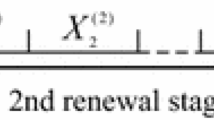Abstract
The Kijima’s type 1 maintenance model, representing the general renewal process, is one of the most important in the reliability theory. The g-renewal equation is central in Kijima’s theory and it is a Volterra integral equation of the second kind. Although these equations are well-studied, a closed-form solution to the g-renewal equation has not yet been obtained. Despite the fact that several semi-empirical techniques to approximate the g-renewal function have been previously developed, analytical approaches to solve this equation for a wide class of underlying distributions is still of current interest. In this paper, a long-time asymptotic for the g-renewal rate is obtained for distributions with nondecreasing hazard functions and for all values of the restoration factor \(q\in [0,1]\). The obtained analytical result is compared with the numerical solutions for two types of underlying distributions, showing a good asymptotic match. The obtained approximate g-renewal rate is employed for maintenance optimization, considering the repair cost as a function of the restoration factor. Several numerical examples are performed in order to show the efficiency of our results.













Similar content being viewed by others
References
Barlow RE, Proschan F (1965) Mathematical theory of reliability. Wiley, New York
Bartholomew-Biggs M, Zuo MJ, Li X (2009) Modelling and optimizing sequential imperfect preventive maintenance. Reliab Eng Syst Saf 94:53–62
Cassady CR, Iyoob IM, Schneider K, Pohl EA (2005) A generic model of equipment availability under imperfect maintenance. IEEE Trans Reliab 54:564–571
Finkelstein M (2008) Failure rate modedling for reliability and risk. Springer, London
Gavrilov LA, Gavrilova NS (2011) Mortality measurement at advanced ages: a study of the social security administration death master file. N Am Actuar J 15(3):432–447
Kahle W (2007) Optimal maintenance policies in incomplete repair models. Reliab Eng Syst Saf 92:563–565
Kaminskiy MP, Krivtsov VV (2006) A monte carlo approach to estimation of g-renewal process in warranty data analysis. Reliab Theory Appl 1:29–31
Kijima M, Sumita M (1986) A useful generalization of renewal theory: counting processes governed by nonnegative Markovian increments. J Appl Prob 23:71–88
Kijima M, Morimura H, Susuki Y (1988) Periodical replacement problem without assuming minimal repair. Eur J Oper Res 37:194–203
Krivtsov V, Yevkin O (2013) Estimation of g-renewal process parameters as an ill-posed inverse problem. Reliab Eng Syst Saf 115:10–18
Murthy DNP (1991) A note on minimal repair. IEEE Trans Reliab 40:245–246
Nakagawa T (1979) Optimum policies when preventive maintenance is imperfect. IEEE Trans Reliab R–28:331–332
Nakagawa T, Kowada M (1983) Analysis of a system with minimal repair and its application to replacement policy. Eur J Oper Res 12:176–182
Tanwar M, Rai RN, Bolia N (2014) Imperfect repair modeling using Kijima type generalized renewal process. Reliab Eng Syst Saf 124:24–31
Vladimirov VS, Zharinov VV (2004) Equations of mathematical physics. Phys. Mat. Lit., Moscow
Wong JSW, Wong R (1976) On asymptotic solutions of the renewal equation. J Math Anal Appl 53:243–250
Yevkin O, Krivtsov V (2012) Approximate solution to g-renewal equation with underlying Weibull distribution. IEEE Trans Reliab 61(1):68–73
Yevkin O, Krivtsov V (2013) Comparative analysis of optimal maintenance policies under general repair with underlying Weibull distributions. IEEE Trans Reliab 62(1):82–91
Acknowledgements
The authors are grateful for financial support to the following Mexican Institutions: CONACYT, SNI and PROMEP.
Author information
Authors and Affiliations
Corresponding author
Additional information
Publisher's Note
Springer Nature remains neutral with regard to jurisdictional claims in published maps and institutional affiliations.
Rights and permissions
About this article
Cite this article
Maximov, S., Cortes-Penagos, C.J. A long-time asymptotic solution to the g-renewal equation for underlying distributions with nondecreasing hazard functions. Math Meth Oper Res 92, 311–341 (2020). https://doi.org/10.1007/s00186-020-00715-9
Received:
Revised:
Published:
Issue Date:
DOI: https://doi.org/10.1007/s00186-020-00715-9




